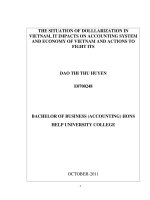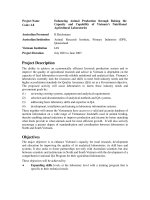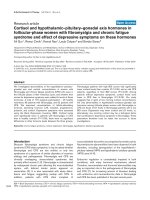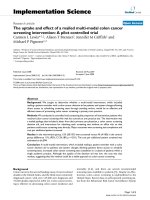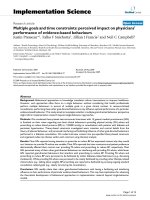the importantce and effect of csr reporting on the performance of vietnam companies
Bạn đang xem bản rút gọn của tài liệu. Xem và tải ngay bản đầy đủ của tài liệu tại đây (860.46 KB, 81 trang )
- 1 -
DECLARATION OF ORIGINALITY
AND WORD COUNT
I hereby declare that the graduation project is based on my original work except for
quotations and citations which have been duly acknowledged. I also declare that it has
not been previously or concurrently submitted for any other course/degree at HELP
University College or other institutions. The word count is 13,290 words.
_____________________
Kieu Trung Kien
17 October 2011
- 2 -
ACKNOWLEDGEMENT
I will not be able to complete this study without the assistance, support and
encouragement of many people. I appreciate their kindness and would like to take this
opportunity to thank everyone who helped me during my performance in this study.
First, I want to express my gratitude to the person who instructed me directly me,
Dr.Pham Duc Hieu. He was pleased to guide, support, and encouraged me from the
beginning of this study. Moreover, I want to say thank you to Ms Sumathi and Ms
Shenba of Help University, who initiated the project and provided me guidance and
support. Finally, I would like to thank my friends who supported and encouraged me to
complete this study, and managers, accountants and employees of the companies I
surveyed, the consumer has to spend time to answer my question. Thanks all.
- 3 -
THE IMPORTANTCE AND EFFECT OF CSR REPORTING ON
THE PERFORMANCE OF VIETNAM COMPANIES
By
KIEU TRUNG KIEN
October 2011
Supervisor: Dr. Pham Duc Hieu
ABSTRACT
Corporate Social Responsibility (CSR) has been known since many years ago and
became a familiar concept in the international business environment, but it is fairly new
to the business in Vietnam. So I want to do this research to find out the implementation
of the company's CSR in Hanoi in particular and Vietnam in general. The objective of
this study was to assess consumer awareness of Vietnames' consumers, managers,
accountants and employees of companies on the concept of social responsibility, CSR
performance of companies in Ha Noi and its impact on the development of the company.
Then, recommends that companies should implement CSR to obtain long term benefits
including financial and reputation.
- 4 -
TABLE OF CONTENTS
DECLARATION OF ORGINALITY AND WORD COUNT…………………………1
ACKNOWLEDGEMENT…………………………………………………… ……….2
ABSTRACT………………………………………………………………… …………3
TABLE OF CONTENT …… ………………………………………………………….4
Chapter 1: Introduction ……………………………………………………………… 8
1.1. Research Background …………………………………… …………………….8
1.1.1 CSR in the world …………………………………………………………….8
1.1.2 CSR in Vietnam …………………………………………………………….9
1.2. Existing problems facing Vietnam in the field of CSR ……………………………11
1.3 Problem Statement ………… …………………………………………………… 12
1.4 Research question ………………… …………………………………………… 13
1.5 Reason for choosing topic… ………………………………………………………13
1.6 Structure of Research ……………………………………………………………14
Chapter 2: Literature Review……………… 15
2.1Definition and conceptualization of CSR……………………………………………15
2.2 The concepts related to CSR ……………………………………………………….16
2.2.1 In term of state management …………………………………………………… 16
- 5 -
2.2.2 Business ethics…………………………………………………………………….17
2.2.3 Corporate cultural…………………………………………………………… ….17
2.2.4 Environment Protection…………………………………………………… ……17
2.2.5 CSR reporting…………………………………………………… …………… 18
2.2.6 Public Relation……………………………………………………… ………… 19
2.3 Theories related to CSR…………………………………………………… …… 19
2.3.1 Carroll`s “Pyramid of CSR”……………………………………………… …….19
2.3.2 Stakeholder theory……………………………………………… ………………22
2.3.3 Legitimacy Theory……………………………………………………………… 23
2.3.4 Triple bottom line…………………………………………………………………23
2.4 Hypothesis………………………………………………………………………… 24
2.4.1 Managers` attitude toward CSR reporting……………………………………… 24
2.4.2 Consumers` attitude toward CSR reporting………………………………………24
2.4.3 Employees` attitude toward CSR reporting……………………………………….25
2.4.4 Accountants` attitude toward CSR reporting………………… …………………27
2.5 Effect of CSR on the performance of Vietnam companies…………………………27
2.6 Methods of effective implementation of CSR…………………………………… 29
- 6 -
Chapter 3: Research Methodology ………………………………………………31
3.1 Research Objectives ………………… 31.
3.2 Research Method ……………………………………………………………… 31
3.3 Data sources……………………………………………………………………….32
3.3.1 Primary data…………………………………………………………………… 32
3.3.2 Secondary data……………………………………………………………………34
3.4 Research tool ……………………………………………………………………….33
3.4.1 Questionnaires………………………………………………… ………….33
3.4.2 Personal interview ……………………………………………… …….33
3.4.3 Annual report……………………………… …………………………… 34
3.5 Data collection……………………………………………………… …………….34
3.6 Sampling……………………………………………………………… ………… 34
3.6.1 Sample size…………………………………………………………………35
3.6.2 Sample techniques…………………………………………………… … 35
3.7 Limitation………………………………………………… ………………………36
Chapter 4: Result Analysis ………………………………………………………… 37
4.1 Collection of Questionnaires ………………… 37
4.2 Description of Result………………… …………………………………… ……39
- 7 -
4.2.1 Manager…………………………………………………………………… ……39
4.2.1.1Findings from questionnaire survey…………………………………… ….39
4.2.1.2 Implementation of CSR: …………………………………………… …….42
4.2.2 Consumer………………………………………… …………………………….45
4.2.2.1 Finding from questionnaire survey…………………………………… ….45
4.2.2.2 Consumers „attitude toward CSR………………………………… ………45
4.2.2.3 Consumer` stated support for CSR………………………………… …….48
4.2.3 Employee………………………………………… …………………………….50
4.2.3.1 Finding from questionnaire survey…………………………………… 50
4.2.4 Accountant…………………………………………………… …………………53
4.2.4.1 Finding from questionnaire survey……………………………………… 53
Chapter 5: Conclusion and Recommendation ……………………………….…….56
5.1 Conclusion ………………………………………….……………………… 56
5.2 Recommendation ……………………………………………….………………58
Reference………………………………………………………….………………… 60
APPENDIX A:………………………………………………………………….…….63
APPENDIX B:……………………………………………………………………… 70
- 8 -
Chapter 1: Introduction
1.1 Research Background
1.1.1 CSR in the world:
CSR has become a real movement and growth and development worldwide. Tens
of thousands of articles, studies, books, magazines, forums, websites, academies,
business, consulting, media and government talk about CSR topics. If we look up the
original phrase "social responsibility of business" in English on Google, we will see
more than 70 million searches (not to mention the terms of CSR in the country-specific).
Consumers in the European and American countries today are not only concerned with
product quality but also value the way companies make products that are
environmentally friendly eco-community, humanitarian, and healthy. However, Annual
statistics on charitable activities in the business world of the British magazine, The
Guardian showed that 100 leading companies in the stock market in London is only less
than 1% of profit before tax for the operation charitable and community projects in the
past year. Although the total amount of British companies to contribute to charities rose
7% to $ 1.6 billion, but only less than 34 companies supporting more than 1% of profits.
Forward and support the charities of the 14 companies‟ ranked bottom of the list less
than 0.01% of the profits. Looking at the other side of the coin, according to the research
center on the management of Ashridge, the management of 10 senior executives, up to 9
people believes that CSR is critical to the business operations of the company. More
than three quarters of managers said that the company should operate according to the
method of social responsibility and community. However, there are companies still
- 9 -
consider CSR as a cost rather than an opportunity. in many developed countries, such as
U.S., South Korea, companies are actively applying the technology investment-friendly
environment has significantly increased revenue: Corporation of America produce light,
Haitech Group investment in 1994 was USD 4.3 billion on pollution controls, from
which the prestige of the company increased rapidly and in 1999 exported $ 8 billion. Or
in Korea, demonstration projects of cleaner production techniques developed from 7 /
1999 to 8 / 2000, with the participation of 15 companies, there were 13 successful
companies. They estimated to save $ 770,000 / year, while only $ 140,600 to invest. We
can see that CSR has been applied to companies in developed countries made long time
ago. As the world's major markets are increasingly more difficult, not only products are
required to ensure quality but also require "cleaner". To successfully penetrate the large
but difficult market such as Japan, America and Europe, companies need to strengthen
research capacity to apply international standards such as ISO 14000 environmental and
standards about environment of the market to penetrate.
1.1.2 CSR in Viet Nam:
CSR is known in Vietnam through the activities of multinational companies
investing in Vietnam. These companies have taken the lead in putting CSR on the
commercial activities of the company. They are always interested in environmental
protection, working environment of workers and many other social problems. So the
content of social responsibility in the foreign company has basically done and highly
effective. We can take some prominent examples like the "I love Vietnam" of company's
Honda-Vietnam; program "a million cups of milk" for the poor children of Vinamilk,
building charity houses for poor people of the Song Da; surgical programs to support
congenital heart defects and to support victims of the Can Tho bridge collapse of
- 10 -
VinaCapital, Samsung; vision rehabilitation program for poor children of the Western
Union
For domestic enterprises, the export company is probably the first to reach the CSR.
Most orders from Europe-US-Japan business require garments, footwear must apply the
good work (SA8000 standard) or to ensure food hygiene and safety (for the joint
fisheries) In addition, many private companies in the CSR issues catch pretty
complex. There are many companies actively implement CSR and create a good image
to the public.
Aware of the Vietnam people have a positive change on environmental issues.
Consumers were more interested in Vietnam to the implementation of CSR in
companies operating in the province Vietnam. This change is partly due to the mass
media like TV, radio; internet is very much addressed environmental issues, in part from
the disaster that the company caused to the environment such as food poisoning,
discharge of wastewater to water pollution and many other environmental problems.
There were some interesting conference on topics such as CSR Asia Forum on social
responsibility of enterprises 6 th, was held on 13/10/2007 at TP. Ho Chi Minh; and
workshop on "Improving the competitiveness of Vietnam through the social
responsibility of business" in collaboration with the Embassy of Denmark held on
08/1/2008. In addition, Vietnam also has the authorized forum committed to introduce
and discuss CSR at: by the Center for Development
and Integration (a private consulting firm people) building, under the sponsorship of
international aid organization Action Vietnam.
On state management in the field of labor, we have the Labor Code in 1994, and
adjusted two times in 2002 (with contents labor agreements, overtime, social security,
- 11 -
subsidies, laid off employees) and 2006 (the contents of labor disputes and strikes). CSR
activities in our country has changed greatly after the Environmental Protection Law
enacted in 2005 replaced the old law in 1994 had almost no effect. Next, a series of
decrees were issued in time to guide the law, putting content on the environmental
protection investment procedures, and institutionalize the work of state management on
construction materials, water charges industrial waste, mining, solid waste management.
In the state of environmental protection, we have the Department and the
environmental protection department under the central and local levels. Remarkably,
after a year since the law was enacted, the last in 2006, the Ministry of Public Security
established the Environmental Police Department and Environmental Police Department
in the provinces. Up to now, the agency has investigated and found hundreds of
pollution caused indignation in public opinion.
The fact that consumer` awareness of CSR is not high. The managers have not
focused, respect and implement CSR in the lax management of the state, the legal
documents are unrealistic, which has led to business easily spleen law, rejecting moral
responsibility of business (M3CPD infected cases sauce, milk contaminated with
melamine) or polluting the environment in severity in a long time without being
processed (for Hyundai Vinashin, Vedan, Miwon).
1.2 Existing problems that Vietnam faces in the field of CSR:
- After the process of rapid economic growth, many countries have paid on the
environment. Fast growth and ecological environment are two very different aspects of
the growing economy. By commitment to the objectives of CSR Vietnam proved not
- 12 -
sacrifice quality of life of people for the purpose of rapid growth in the short term.
Through the service of food poisoning (soy milk), we see that state agencies are often in
the passive and documents are not adhere to the law practice. But, it requires accurate
law system.
- But even if the law Vietnam has relatively strict rules on the implementation of CSR
issues in many companies, the pollution cases occurred more than ten years without
being detected and managed, that agencies do not take their responsibilities. This is
perhaps the key issues that need our immediate solutions.
- Civil complaint mechanism in our country is almost very little used. Sense of
community and sense of protecting the interests of the people is very low. It can be said
in front of large businesses, local people feel alone, weak and they lack the support of
government.
1.3. Problem Statement:
Nowadays, CSR is more important to the business in Vietnam through a series of
alarming cases of corporate responsibility to the environment and society. There are
many recently examples such as environmental damage Vedan River Market Fabrics, for
the purchase of raw milk at low cost Vietnam Milk Company, for use of expired
ingredients of Tan Hiep Phat, bitter taste of potato company Pepsico Vietnam and most
recently in the case withdrawal of milk allergy company FrieslandCampina. All the
above companies are big business and have many CSR activities as the development
programs of dairy Vinamilk and FrieslandCampina. This is beyond the limits of the
- 13 -
taxpayers, create jobs and protect the environment. The scholarships, study promotion is
done. So what has caused things to go down pretty picture of corporate capital? The
incident not only demonstrates a lack of corporate responsibility but also a weakness in
identifying the challenges and issues to protect the interests of the business environment
in which businesses are participating Business. So, many corporations and big business
in Vietnam build CSR set criteria are central to the overall business strategy to promote
and support business creatively solve problems and challenges in the business. CSR
approach can support both enterprise development and sustainable business and
contribute to the protection and improvement of social standards.
1.4 Research question
The purpose of research question is to analyze the relationship between the importance
and effect of CSR reporting on the performance of Vietnam companies – It includes:
Sub-problem 1: Why is CSR very important for operating of a company?
Sub-problem 2: What is effect of CSR on the performance of Vietnam companies?
Sub- problem 3: What are methods of effective implementation of CSR?
1.5.Reason for choosing topic:
In developed countries like Europe and America, there are many researches about
CSR. But in Vietnam the number of research projects on CSR is very limited. I hope
- 14 -
my graduation project can play a part to clarify the importance and impact of social
responsibility for the financial activities of companies in companies in Vietnam.
1.6. Structure of research: This project is divided into five following chapters:
Chapter I: Introduction
Chapter II: Literature Review
Chapter III: Research Methodology
Chapter IV: Result Analysis
Chapter V: Conclusion and Recommendation
- 15 -
Chapter 2: Literature Review
2.1 Definition and conceptualization of CSR
There are many different definitions of CSR. Each organization or company, the
government recognizes CSR as the angle and point of view, depending on the conditions
and characteristics. Keith Davis (1973) offered a broad concept of "CSR is the interest
of the business and react to problems beyond satisfying the legal requirements,
economic and technology".According to Matten and Moon (2004) "CSR is a concept
cluster includes several other concepts such as business ethics, corporate philanthropy,
corporate citizenship, sustainability and environmental responsibility. It is a concept and
always be challenged in every economic situation, political and social characteristics.
"Thus, the essence of CSR is the view of the role of business in relation to the role state
that the concept of CSR is always changing, always new range depends not only time
but also space where the debate on CSR takes place. The World Business Council for
Sustainable Development defines the CSR as “business commitment to contribute to
sustainable economic development, working with employees, their families, the local
community, and society at large to improve their quality of life”. Under this point of
view, the CSR rests on the fundamental pillars of both the economic growth and the
quality of life as an engine for “sustainable” development. Besides, British Government
said "CSR is the voluntary action by business performance, in addition to compliance
with minimum legal requirements, to satisfy the competitive needs of business and
social interests." According to the Corporate Social Responsibility Newswire Service:
- 16 -
the CSR is “the integration of business operations and values whereby the interests of all
stakeholders including customers, employees, investors and the environment are
reflected in the company‟s policies and actions.”
2.2 The concepts related to CSR
2.2.1 In terms of state management:
Today, in the world, many countries have put the contents of CSR into laws and
regulations in many different forms. All these countries are keen to implement corporate
social responsibility will be implemented in all countries in the world and it has become
a common international goals. In 1999, a global agreement (Global Compact) has been
Secretary General of the United Nations (UN) Kofi Annan proposed at the World
Economic Forum and May 7 / 2000 was officially launched as a code of UN's handling
of social responsibility of multinational companies. This rule sets, including 10 rules to
ensure respect for human rights, welfare, anti-child abuse, forced labor, environmental
protection, fight against corruption but not the documents are binding but is
recognized as a formal framework discussed in the UN forum. For the institutions of the
region, CSR was the European Commission formally recognized early on, "is that
businesses take social concerns and environment on business activities and relationships
with their own shareholders, on a voluntary basis".
2.2.2 Business Ethics:
It is undeniable that CSR is regarded as an aspect of ethics in the business world.
Business Ethics is to express the standards and principles of society and in the world
- 17 -
recognized business, as the rules of communication, relationships between staff and
management, or the value of the management and community in the implementation of
the enterprise, allowing management to behave in an honest and responsibility to the
community and each other. Business Ethics is an expression of balance between the
interests of management in the implementation of business objectives with the interests
of employees in the company, the interests of consumers and public interest.
2.2.3 Corporate cultural:
Corporate culture is the values about culture need to be built in the survival and
improvement in business, becoming the values, perceptions and practices. Corporate
culture rooted in the traditional activities of enterprises and governs emotions, thoughts
and behavior for all members of the business. Corporate culture is the behavior and
communication of the members of a business and creating a culture for that business.
Corporate culture also contributes to the difference between the business and created no
small advantage in business
2.2.4 Environment Protection:
Many people believe that pollution is not the result of economic growth. However, no
one can deny that economic growth may cause environmental pollution. Although we
see a lot of national economic development leads to environmental degradation and
pollution, but we need to assure that environmental protection and sustainable
development is never the result of economic growth which is the result of policy choices
and implementation. The problem posed to those who are in charge, we must do and
how to have a special policy of developing the economy and environmental protection
- 18 -
and sustainable development. Chemical industry, we are faced with many challenges in
environmental protection. There are figures given Hanoi losses each year up to USD 23
million due to air pollution. To be able to achieve all the objectives of environmental
protection and sustainable development of the company should be more responsible for
environmental issues like air pollution, water pollution caused by smoke, dust and
emissions from chemical plants.
2.2.5 CSR reporting:
CSR Report is the form of new reports of companies in Vietnam. CSR Report is not
the financial statements, it is only reporting on CSR performance of companies.
Although this report does not affect the financial statements of the company, it is very
important and should be reported annually. Government, communities and consumers all
want the company announced the company's CSR report. CSR reports help companies
avoid trouble from the law. In addition, they also increase the reputation and prestige of
the company. The company made good CSR report will be the support of investors and
attract more customers. CSR reporting is one way that organizations use to communicate
information about social issues and the environment of different stakeholders. CSR
report can be mandatory or voluntary (Van der was, in 2004, Woodward et al, 1996).
Support the implementation of CSR reports will help prevent the damaging
consequences resulting social and environmental activities and decisions of the
company. Therefore, to protect citizens and ensure full information social responsibility
requirements issued from government actions authorized CSR report (Doane, 2002).
Besides, even in the form is still relatively underdeveloped, reporting is required is
gradually accepted among academics. The report has been deemed necessary especially
- 19 -
with the stakeholders. Because stakeholders will be informed more through the
symmetrical, form of communication and dialogue (Van der was, in 2004, Woodward et
al, 1996).
2.2.6 Public Relation
Public relation is very popular in the business. It is very important for managers to
recognize the relationship between public relation and CSR. CSR is the implementation
responsibility to community. Companies should make full responsibility for employees,
shareholders, customers, society and environment. It is undeniable that the company
expects to publish the best action on CSR to customers, shareholders, consumers and
social support for the company and so public relation is used as a helpful tool. Public
Relation is the way to make the company famous in the community. However, in an
interview conducted by Matthew Rochte in May 4, 2009, Public relation can be "good
luck and a curse to CSR". Public relation can bring well-known company or a company
or risky misconceptions about CSR and public relation error in the operation”.
2.3 Theories related to CSR
2.3.1 Carroll’s “Pyramid of CSR”
Nowadays, CSR has become more and more popular. Therefore, many researchers have
given different opinions on the content, concepts and scope of CSR. Among them, as far
as I know,the concept of "pyramid" of A. Carroll (1999) is complete and the most
widely used.
- 20 -
Figure1. Models "pyramid" of Carroll CSR [4]
According to Caroll, CSR includes responsibilities about economic, legal, ethical and
charitable:
(i) the biggest concern of all businesses is to maximize economic profit, competition,
efficiency and growth. They founded the first search engine of profit. Moreover, the
economic enterprise is the basic cell of society. Therefore, business functions must
always be placed on top. The remaining responsibilities shall be based on a sense of
responsibility of the business economy.
(ii) Responsibility for compliance with the provisions of the law is part of the "contract"
between business and society. State have responsibility "coding" of social norms and
ethics in the legal documents, to pursue business in the framework of a fair economy and
meet the standards and prices expectations of society. Responsibilities for economic and
legal are two indispensable basis of a business.
- 21 -
(iii) Responsibility is a code of ethics, values, social acceptance, but has not been
included as a content of law. In general, the law can only go after reflecting changes in
the rules of the new social behavior. Moreover, in social ethics has always existed in
their errors, mistakes are not clear. The mistakes that impact significantly on society but
are not regulated under the law. Therefore, to comply with the law can only be
considered as meeting the required standards at least social setting. Enterprises also need
to make commitments outside the law. Moral responsibility is voluntary, but is at the
heart of every business. For example, no overtime work, safe working conditions,
sufficient information for consumers, not to use genetically modified foods, have
credibility with partners, community relations, shareholders minorities, competitors
are all open issues and the level of commitment depends on the moral responsibility of
business like.
(iv) Responsibility for charities is the behavior of enterprises based on social
expectations, such as contributions to support poor families, funded scholarships for
gifted students are disadvantaged, to contribute for community projects such as building
hospitals, schools Unlike business ethics is to create a good product and does not
violate social norms of business, charity responsibility is entirely voluntary. If they do
not perform the level of social responsibility, they are still considered as meeting the
standards that society wants. This model is comprehensive and feasible, can be used as a
framework for reflection on the status of CSR policies. Moreover, the boundary between
the standards of responsibility is always overlapped, interact. In conformity with the
provisions of law and good order will certainly affect the economic cost to businesses.
Therefore, the companies made responsible for social charity are always appreciated.
- 22 -
2.3.2 Stakeholder theory
The stakeholder theory, originally detailed by Freeman (1984), is a theory of
organizational management and business ethics that addresses morals and values in
managing an organization. In this theory, the concept “stakeholders” refers to any group
or individual who influenced directly or indirectly, by the actions of the firm. In the
traditional view of the firm, the shareholders view, the shareholders or stockholders are
the owners of the company, and the firm only addresses the needs and wishes of its
owners. However, stakeholder theory argues that there are other parties involved,
including governmental bodies, political groups, trade associations, trade unions,
communities, associated corporations, prospective employees, prospective customers,
and the public at large. From the ethical perspective, organizations are obliged to deal
fairly between the stakeholders (Deegan, 2009), that is, organizations should be
responsible to the interests of shareholders because they are capital in invest in
companies they have a right to know and inform the company's CSR situation. In case of
conflict stakeholders, the board is tasked to explain and inform to achieve balance the
interests of shareholders. Based on the theory of Freeman, Baron (1995) has divided the
parties into two groups, known as market and non-market. Group market includes
customers, competitors, employees, partners and suppliers in general. By contrast non-
market groups, including non-governmental organizations, government, security
management, organizational and environmental standards, media, society or community.
- 23 -
Both groups have created their influence at different levels to implement the social
responsibility of companies. From this perspective, many activities conducted by
companies related to the expectations of stakeholders (Friedman and Miles, 2002). This
created a great attention of the stakeholders because the CSR situation directly affected
the company's interests and the interests of stakeholders. Therefore, managers need to
inform not only the financial situation but also to inform both the implementation of
CSR to stakeholders.
2.3.3 Legitimacy Theory
Legitimacy theory is understood as the implementation of CSR by companies will help
companies avoid legal trouble. A company is considered legal when that company
fulfills its social responsibilities and meets the expectations of the community. So the
responsibility for disclosing information about the CSR will be made to become a legal
entity. The legitimacy of the theory can also explain the influence of culture on CSR
reporting. This theory contributes to improving the relationship between accounting and
the community from the perspective of a company. A company will voluntarily report
on operations management recognized that the specific information requested by the
society in which it works (De Villiers and Van Staden, 2006).
2.3.4 Triple bottom line
Triple bottom line can be defined as one of the support mechanisms for reporting on
CSR. Triple bottom line was defined by Elkington (1997) report provides information on
economic performance, environmental and social, of an entity. The concept of three
- 24 -
reports on economic, environment and society is directly associated with the concept and
objectives of sustainable development.
2.4 Hypothesis
2.4.1 Managers` attitude toward CSR reporting
Today, businesses recognize that social responsibility is directly related to reputation
and brand of the company. However, combining social responsibility (CSR - Corporate
Social Responsibility) and the branding is not a suitable route can lead to disastrous
consequences. The managers are responsible for the results of business operations before
the Board of Administration, to enforce the proper strategy has been through the
Executive Council. In Vietnam, due to the characteristics of Vietnam's new economy
shift from subsidies to market, the role and functions of directors and chairman of the
board of a company sometimes is not explicitly clear separation. Chairman of the board
usually is considered as director (CEO) of the company, and directors often rely heavily
on chairman of the board as executive decisions. This reflects quite well in state owned
enterprises, private enterprises have come up from households and small production,
family business. Therefore, managers must understand the importance of reporting and
the implementation of CSR with business operations of the company. And then, the
following hypothesis is developed:
: Managers’ attitude toward CSR and CSR reporting is positive.
H
0:
Managers’ attitude toward CSR and CSR reporting is negative.
- 25 -
2.4.2 Consumers` attitude toward CSR reporting
Consumer confidence for businesses that are hurt seriously before doing fraudulent
situation, lack of responsibility to the community has become so popular. The world
financial crisis has rapidly spread worldwide and is becoming major obsession of the
business community in the country. But for ordinary people, still an obsession other
equally serious, that the threat of poor quality goods, especially those products directly
related to health, and environmental conditions life seriously damaged. Perpetrators of
this situation are that businesses do not implement CSR. Such events sauce contains
urea, or growth stimulants infused cattle through animal feed but would not settle up,
then back outbreak of melamine contaminated milk story, wine is produced with alcohol
fatal industrial accidents, along with fake fertilizer and poor quality of gas stations and
trade fraud. In additional, with environmental destruction and action, showing that
business ethics and social responsibility in an enterprise component is degraded. They
are run by profit, despite its consequence for customers, for whom business will be
confirmed to be treated as "God". In business, confidence is important. With a more
competitive market today, choosing the right products to the consumer and of course
everyone wants to buy the product matches the quality of money. With such a situation,
the hypothesis for consumer behavior can be developed:
: Consumer behavior is influenced by companies’ CSR practices and
disclosures.
H
0:
Consumer behavior is not influenced by companies’ CSR practices and
disclosures.

